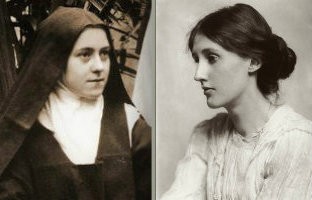Saints and doubters
Are faith and doubt opposites? Thérèse of Lisieux and Virginia Woolf are part of the same history.

Leslie Stephen famously gave up his priestly orders—and with them, his academic appointment at the University of Cambridge—when he realized that he could no longer accept the story of Noah as sacred truth. His essays on agnosticism drew his future wife, Julia, to him. She had lost her beloved first husband to an early death, and her Christian faith along with him. Stephen’s essays were a balm to her, an assurance that morality did not depend upon religious belief.
Their daughter, Virginia Woolf, raised without a faith to lose, sought new forms of the sacred in her writing, new expressions of religious experience focused around what she called “moments of being”—moments when the pattern through which we are all connected is briefly illuminated.
Thérèse of Lisieux was born eight years after Leslie Stephen resigned his post and nine years before Virginia was born. At first glance, Thérèse’s life was completely different from theirs. The Stephen family descended from evangelical Protestants; Thérèse’s family, from pious Roman Catholics. At the age of 15, Thérèse entered a Carmelite monastery. Nine years later she died of tuberculosis. She became famous through her autobiography and her letters for her “little way” to God.




